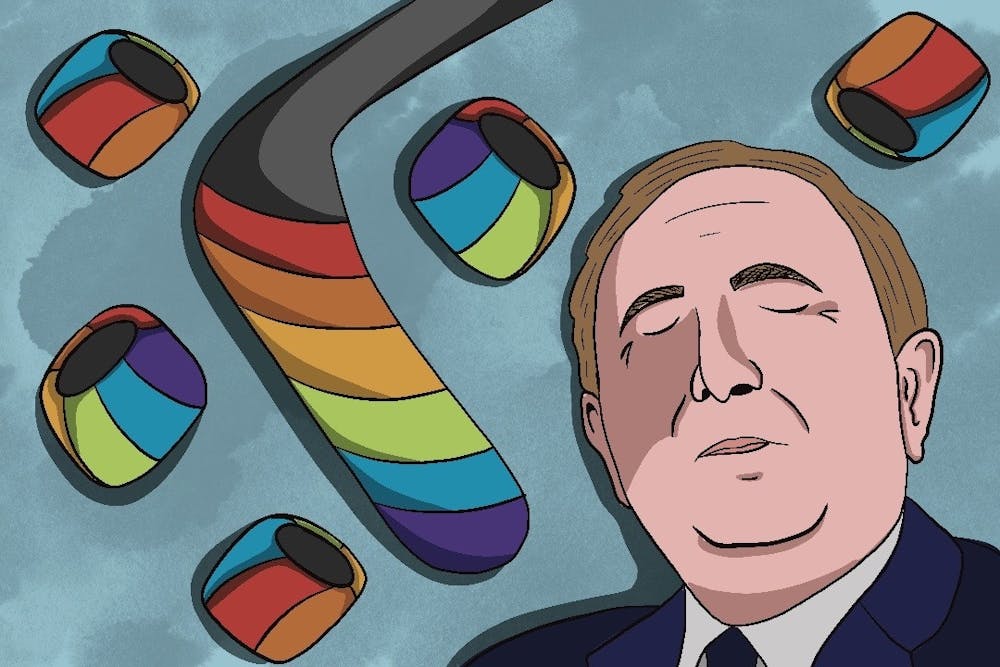The NHL reversed its backward decision to ban pregame Pride gear this week after an Arizona Coyotes player, Travis Dermott, defied the authoritative ban. His courageous stance for inclusivity should be celebrated.
Over the summer, the NHL banned pregame Pride jerseys and tape after several players refused to wear the gear last season. By doing so, the NHL backtracked on years of extending a hand to LGBTQ+ fans. Season after season, players and teams wore sweaters decked out with flashy rainbow colors and Pride Tape to spice up otherwise dull equipment and to show LGBTQ+ fans that they were welcome to the sport.
Edmonton Oilers captain Connor McDavid and Boston Bruins captain Brad Marchand immediately decried the ban. But it took an unknown second-line defenseman to end the NHL's ruling and support the LGBTQ+ community.
Dermott has advocated for LGBTQ+ rights throughout his NHL career and was raised to stand up to mistreatment. Dermott wrapped Pride Tape on the top of his stick before the Coyotes' game against the Anaheim Ducks in Tempe.
"Like my parents said growing up, 'How awesome would it be to be the guy people look up to?' That's what really hit home when I was a kid, especially from my mom," Dermott told PHNX Sports. "You want to grow up and be that guy."
While the league changed its decision, the fact that the NHL instated the Pride Tape ban initially upset some ASU LGBTQ+ club leaders.
Sophie Warnock is an activist and the president of Confetti, an LGBTQ+ student organization on the Downtown Phoenix campus. Warnock thought the NHL was forcing people to hide their identities with the ban and praised Dermott for taking a stand.
"It just goes to show how strong it is and how much it's been developed," Warnock said. "It just goes to show that even if you take away flags or other stuff like that, you're not going to take down the LGBTQ community. It's going to be there no matter what you do."
Brenna Garcia, facilitator of advocacy for the ASU Rainbow Coalition, was also proud of Dermott for violating the ban. Garcia said professional leagues must use their platform to create welcoming environments so players don’t have to protest in the first place.
"The NHL should prioritize making their operations more diverse and welcoming because there clearly are queer and trans athletes seeking community and representation," Garcia said. "Being able to have things like pride tape and jerseys are the bare minimum."
The NHL's decision is a step in the right direction for a sport infamous for its toxic culture.
In past years, leagues have permitted a toxic "bro culture" where players only talk about sports, women or music. Hockey's glaring culture issue creates an atmosphere where anyone who isn't seen as normal is excluded, making potential fans scared even to attend games.
"I'd also feel unsafe because if I can't even sport my pride flag, how am I supposed to feel safe in a community?" Warnock said. "Like I could be attacked, and they wouldn't care because I can't even show a pride flag."
As a lifelong fan, it saddens me that people don't feel safe watching hockey. This sport has brought me cherished memories of attending St. Louis Blues' games with my dad, where we sing "Gloria" and count goals with the famous "towel man." I've been on top of the world when my team won the Stanley Cup and devastated when my childhood hero was traded.
I've also seen hockey build community off the ice and bridge gaps between people who would've never met. I've seen diehard fans embrace strangers, packed subway cars celebrate exciting wins, and even bitter rivals share a laugh.
No one should feel excluded from a sport that can create so much joy. That's why we need to thank Dermott for standing up for his beliefs and proving that hockey can change for the better to include new demographics of fans.
Hockey should be for everyone, not a select few.
Edited by Mia Osmonbekov, Walker Smith and Caera Learmonth.
Reach the reporter at jcbarron@asu.edu and follow @jackcbarron on X.
Editor's note: The opinions presented in this column are the author's and do not imply any endorsement from The State Press or its editors.
Like The State Press on Facebook and follow @statepress on X.
Jack is a senior studying sports journalism. This is his fourth semester with The State Press. He has also worked at Radio Sucesos and XPR Sport Experience in Argentina.




